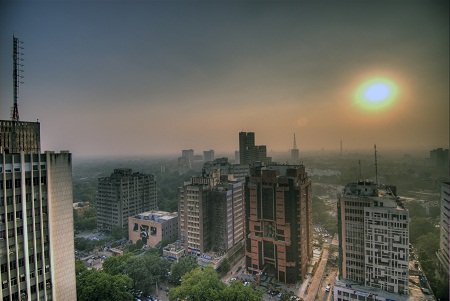India, a land of diverse cultures and traditions, also faces unique challenges when it comes to maintaining law and order. The sheer size and population of the country make governance a tough task, and certain states have emerged as hotspots for violent crimes.
Crimes like murder, kidnapping, rape, extortion, robbery and domestic violence being prevalent in most parts of the country. The rate of crime is growing with every passing day, which is a matter of great concern. Though the statistics are not healthy in all parts of the country, some states are more susceptible to crime than others. Despite efforts made by law enforcement agencies, these states continue to be unsafe with violence and crimes surfacing here time and again.
Here is a list of top most violent states in India:
1. Uttar Pradesh
Uttar Pradesh (UP) continues to top the list of violent states in India. As the most populous state, it accounts for a significant percentage of India’s violent crimes, including murders, kidnappings, and extortion. The National Crime Records Bureau (NCRB) 2023 report states that UP recorded the highest number of murder cases in the country.
Key Issues:
- Political and Caste Violence: UP frequently witnesses caste-based violence, often stemming from deep-rooted societal divisions.
- Organized Crime: The state’s vast rural and urban divide has provided a breeding ground for gang-related activities.
Efforts to Mitigate:
- Increased police presence in rural areas.
- Digitization of crime records and establishment of fast-track courts.
2. Delhi

The national capital, Delhi, struggles with its reputation as one of the most unsafe cities in India. High-profile cases of robbery, sexual offenses, and assaults have kept Delhi in the spotlight for all the wrong reasons. NCRB’s data indicates a consistent increase in crimes against women and minors.
Key Issues:
- Urbanization and Population Density: The rapid influx of migrants has created socio-economic disparities, leading to crimes of desperation.
- Drug and Substance Abuse: Many crimes, including theft and assault, are linked to substance abuse.
Efforts to Mitigate:
- Installation of CCTV cameras across the city.
- Awareness campaigns focusing on women’s safety.
3. Maharashtra

Maharashtra, home to India’s financial capital Mumbai, faces significant challenges with violent crimes, particularly in urban areas. The state’s large metropolitan centers are hotbeds for organized crime, domestic violence, and robberies.
Key Issues:
- Urban Crimes: Crimes such as chain-snatching, assaults, and burglaries are rampant in Mumbai and Pune.
- Rural Backlash: In rural Maharashtra, farmer distress has occasionally led to violent protests.
Efforts to Mitigate:
- Modernization of police force and cybercrime units.
- Initiatives to address rural grievances through welfare programs.
4. Bihar
Bihar’s history of lawlessness has been a subject of national debate for decades. The state continues to grapple with high rates of murders, kidnappings, and other violent crimes, despite efforts to improve its law-and-order situation.
Key Issues:
- Socio-economic Challenges: Poverty and unemployment have contributed to a surge in criminal activities.
- Political Violence: Elections in Bihar often witness violent clashes and intimidation.
Efforts to Mitigate:
- Community policing initiatives.
- Recruitment drives to bolster the police force.
5. West Bengal
West Bengal has witnessed a disturbing trend of political violence, especially in the aftermath of elections. Additionally, crimes against women and children are alarmingly high.
Key Issues:
- Political Turmoil: Political clashes between rival parties often escalate into full-blown violence.
- Human Trafficking: Proximity to international borders has made the state a hub for trafficking activities.
Efforts to Mitigate:
- Border patrol enhancements.
- Specialized task forces to address trafficking and political violence.
6. Madhya Pradesh
Madhya Pradesh ranks high in cases of domestic violence and sexual offenses. NCRB data consistently places MP at the top when it comes to crimes against women, particularly rapes.
Key Issues:
- Gender-Based Violence: A patriarchal society and lack of awareness contribute to crimes against women.
- Alcohol Abuse: Domestic violence often stems from alcohol abuse.
Efforts to Mitigate:
- Women’s safety helplines and legal aid centers.
- Campaigns promoting gender equality and education.
7. Rajasthan
The state of Rajasthan, known for its rich cultural heritage, has unfortunately seen a rise in violent crimes such as assaults and sexual offenses. NCRB data highlights the increasing frequency of such cases in recent years.
Key Issues:
- Tourist Safety: Crimes against tourists have tarnished the state’s reputation.
- Honor Crimes: Instances of honor killings are still prevalent in rural areas.
Efforts to Mitigate:
- Dedicated tourist police in major cities.
- Strict penalties for honor-based crimes.
8. Assam
Assam’s strategic location in the Northeast makes it vulnerable to ethnic and insurgency-related violence. The state also faces challenges with crimes like kidnappings and homicides.
Key Issues:
- Ethnic Clashes: Tensions between indigenous communities and settlers often escalate.
- Insurgency: Armed groups operating in remote areas contribute to instability.
Efforts to Mitigate:
- Peace talks with insurgent groups.
- Development projects to integrate marginalized communities.
9. Haryana
Haryana’s rapid industrialization and urbanization have led to an increase in violent crimes, particularly in cities like Gurugram and Faridabad. Honor killings and gender-based violence are also significant concerns.
Key Issues:
- Gender Imbalance: A skewed sex ratio has contributed to crimes against women.
- Land Disputes: Rapid urbanization has led to conflicts over land.
Efforts to Mitigate:
- Strict implementation of laws against honor killings.
- Awareness campaigns focusing on gender equality.
10. Kerala
Despite being one of the most literate states, Kerala faces its share of violent crimes. Political violence and assaults dominate the crime landscape in the state. The reason may be that it has a population which belongs to diverse religions such as Hinduism, Islam and Christianity.
Key Issues:
- Political Rivalries: Clashes between political party workers often turn violent.
- Substance Abuse: Alcoholism is a contributing factor to domestic violence and assaults.
Efforts to Mitigate:
- De-addiction centers and awareness programs.
- Fast-track courts for political violence cases.
Conclusion
The issue of violent crimes in India is complex, influenced by socio-economic factors, cultural practices, and political dynamics. While states like Uttar Pradesh and Delhi struggle with urban crimes, regions like Assam and Bihar face unique challenges rooted in ethnic and economic disparities.
Efforts to mitigate these issues require a multifaceted approach involving policy reforms, community engagement, and technology-driven solutions. As India marches forward, addressing these challenges will be crucial to ensuring a safer and more secure environment for its citizens.
Santosh Kumar is a Professional SEO and Blogger, With the help of this blog he is trying to share top 10 lists, facts, entertainment news from India and all around the world.
